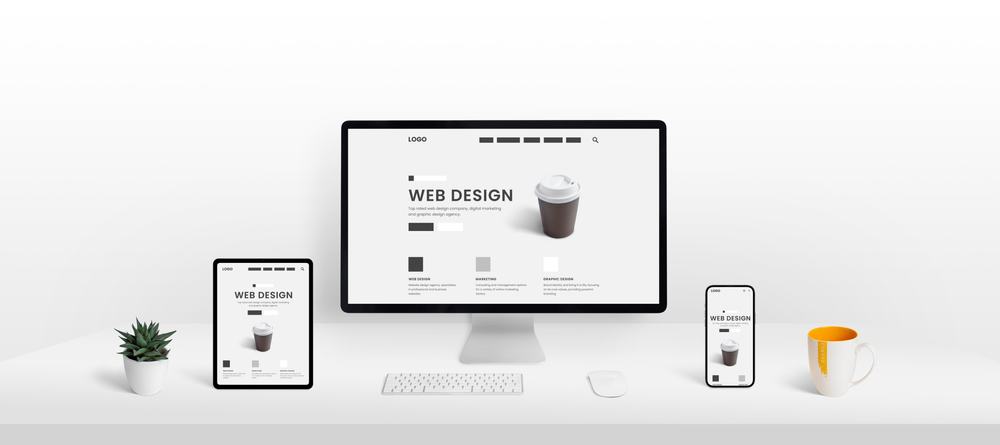Selecting The Perfect Website For Your Business
Selecting the perfect website for your business is a critical step that should align with your brand’s strategy, customer needs, and long-term goals.
As the digital face of your company, it is imperative to choose a design that not only looks appealing but also enhances user experience and fulfills the specific functions required by your business and its clientele.
Understanding the unique characteristics of your business and the expectations of your audience is paramount in creating a website that authentically represents your brand and drives success.

The digital landscape offers a plethora of web design options, and identifying the most beneficial features that resonate with your business model is essential.
Whether you’re an online retailer requiring a seamless e-commerce platform, a local restaurant seeking to integrate online reservations, or a professional service provider looking to establish a content-rich site, the choice of platform and design will profoundly impact the effectiveness of your online presence.
Making an informed decision means considering a variety of crucial factors, from user navigation and visual appeal to search engine optimization and technical performance.
Key Takeaways
- Aligning website design with business strategy and customer needs is crucial.
- Diverse business models necessitate customized website features and functions.
- An effective website combines appealing design with performance and SEO optimization.
Identifying Your Business Needs

Before creating a website, businesses must understand their specific needs. This understanding is pivotal for a website that aligns with business goals and engages the intended audience effectively.
Evaluating Business Goals
Businesses should begin by listing their primary objectives.
Whether it’s increasing sales, generating leads, or providing customer service, each goal will dictate different features and design elements on the website.
For example, a business aiming to increase sales may benefit from an e-commerce website, while one focused on displaying their portfolio will need a design that showcases previous work prominently.
Determining Your Target Audience
Knowing the target audience is crucial for shaping the website’s design and functionality.
For instance, a website targeted at professionals may have a more conservative design with in-depth information, whereas one aiming for a younger demographic might opt for vibrant colors and interactive elements.
Analytics tools can help provide data on the audience, allowing for a more tailored website experience.
By addressing these two critical aspects, businesses can ensure their website serves its intended purpose and reaches the appropriate audience.
Types of Websites:

Choosing the right type of website for your business is critical in establishing an online presence. It must align with your company’s goals, customer engagement strategy, and brand identity.
Here are four essential types of websites, each tailored to meet different business needs.
Small Business
A Small Business website acts as the digital storefront for a local company. The primary function is to inform visitors about the company’s services, location, and operating hours.
For instance, this Forbes article highlights how a small business site should provide clear contact information and represent the company’s brand consistently.
E-Commerce
E-Commerce websites serve as online marketplaces where transactions for goods or services take place. They must offer a seamless, secure shopping experience and include features such as shopping carts, customer reviews, and payment gateways.
Notable platforms for e-commerce include Shopify and BigCommerce with WooCommerce being the best e-commerce plugin for WordPress.
One-Page
A One-Page website contains all content on a single, long scrollable page.
It’s perfect for businesses with a concise message or a single product or service who want to guide visitors through a linear narrative.
The simplicity of design and navigation optimizes user experience and is often used for particular campaigns or product launches.
Portfolio
For individuals and businesses that need to showcase work visually, a Portfolio website is key.
This type includes galleries, slideshows, and case studies, offering a professional platform to display skills and past projects.
Key elements include high-quality images and descriptions, and for inspiration, creative professionals can look at a variety of templates as referenced by Wix.com.
We explore the question of One-page vs. Multi-page Website – Which is Better? more in depth in the linked article.
Choosing the Right Platform

Selecting the appropriate website platform is a crucial decision for a business. It can influence the scalability, functionality, and ease of use for both customers and site administrators.
Content Management Systems
Content Management Systems (CMS) offer a dynamic framework for creating and managing digital content.
WordPress is a prominent CMS that boasts flexibility and an extensive plugin ecosystem, fitting a spectrum of business needs. It enables businesses to maintain a robust online presence with relative ease of content updates.
The open-source nature of WordPress, exemplified through options like WooCommerce, allows for extensive customization.
E-commerce Builders
E-commerce platforms are specialized for online sales and include various tools to manage products, process payments, and handle inventory.
Shopify is a notable e-commerce builder, offering tiered plans starting from $29 per month that encompass store setup, product management, and basic payment processing.
Businesses can leverage platforms such as Shopify and BigCommerce for streamlined storefronts and operational ease.
Website Builders vs. Custom Development
Businesses must weigh the benefits of website builders against custom development.
Website builders provide templates and drag-and-drop interfaces for quick website creation, suitable for those with limited technical expertise.
In contrast, custom development is tailored to specific business needs but requires significant investment in time and resources.
This decision hinges on the unique requirements and future growth trajectory of a business.
Design and User Experience
When building a website for a business, the design and user experience are pivotal in determining how effectively the site engages and retains visitors. These elements directly influence conversion rates and brand perception.
Responsive Design Principles
Responsive design ensures that a business’s website is accessible and provides an optimal experience across a variety of devices and screen sizes.
Mobile-first approaches are often employed because a substantial proportion of internet browsing occurs on smartphones.
Websites like WANDR showcase best practices in responsive design by adapting to user needs and device capabilities fluidly.
Intuitive Navigation
A website should have a clear and intuitive navigation system that allows users to find information quickly and easily.
This includes a logical page structure, streamlined menus, and straightforward pathways for users to complete actions, whether it’s making a purchase or contacting the business.
Sites recognized by organizations such as Awwwards illustrate the importance of navigational clarity in providing a superior user experience.
Visual Hierarchy
Implementing a visual hierarchy on a website, guides users’ attention to key elements in order of importance, generally through the use of size, color, and layout placement.
Forbes Advisor features examples showing how effective visual hierarchy can be applied to direct user focus to primary actions and content, facilitating a more engaging and productive user experience.
Optimize Your Website for Search Engines

When setting up a website for your business, it’s critical to ensure it’s visible on search engines.
Search Engine Optimization (SEO) enhances the likelihood that potential clients will find your site when they’re searching online for services or products you offer.
Keyword Research
Keyword research is the foundation of SEO. It involves identifying the words and phrases that potential customers use to search for products or services.
Business owners should use tools like Moz’s Keyword Explorer or Google’s Keyword Planner to find relevant keywords with high search volumes and target these in their website content to improve their search engine rankings.
SEO Best Practices
SEO best practices encompass a range of tactics designed to improve a website’s search engine rankings. These include producing high-quality content, optimizing title tags and meta descriptions, and building quality backlinks.
The Google SEO Starter Guide is a critical resource for understanding how to make small changes that have a big impact on your website’s visibility.
Mobile Optimization
With over half of global web traffic coming from mobile devices, mobile optimization is no longer optional.
It’s essential that a website displays well on mobile platforms and maintains fast loading times.
For beginners, Google offers guidance to optimize your site for mobile users, ensuring a positive user experience and contributing to better search engine rankings.
Frequently Asked Questions
What are the top free website builders currently available?
Free website builders like Wix and Weebly offer users the ability to create websites without upfront costs. They provide a range of templates and drag-and-drop interfaces for ease of use.
How do website platforms differ and which is ideal for my needs?
Website platforms vary in features, ease of use, scalability, and cost.
Platforms like Squarespace are ideal for users who need elegant design with minimal technical effort, while WordPress is beneficial for those requiring extensive customization and control.
Which website builders cater best to the creative portfolio requirements of artists?
For artists, website builders such as Format and Pixpa cater specifically to creative portfolios, offering aesthetic templates and multimedia integration that are essential for showcasing artwork.
What affordable website options are most suitable for new startups?
Startups often need cost-effective solutions like Jimdo and Site123, which provide easy-to-use tools and free plans to create a professional online presence.
How can a small business effectively sell products online?
Small businesses can effectively sell products online by using e-commerce platforms like Shopify that offer comprehensive selling tools, payment processing, and inventory management.
For small businesses looking at e-commerce, which website builders are recommended?
For small business e-commerce, website builders such as BigCommerce and Shopify are recommended for their robust e-commerce features, scalability, and user support.
Building a WordPress based WooCommerce site is another great option, provided your developer not only is good at development, but also pairs it with a great hosting and ongoing web care solution as well.
In Conclusion
When choosing to build a website for your business, you need to make sure you consider all of your business needs, objectives and goals and make an informed decision.
We hope this article helped inform you of your options and considerations needed to realize your website dream.
If you’d like to explore the possibility of having an award winning website development team help you design and develop a website for your business, give the helpful experts at LocalBizGuru a call today!



